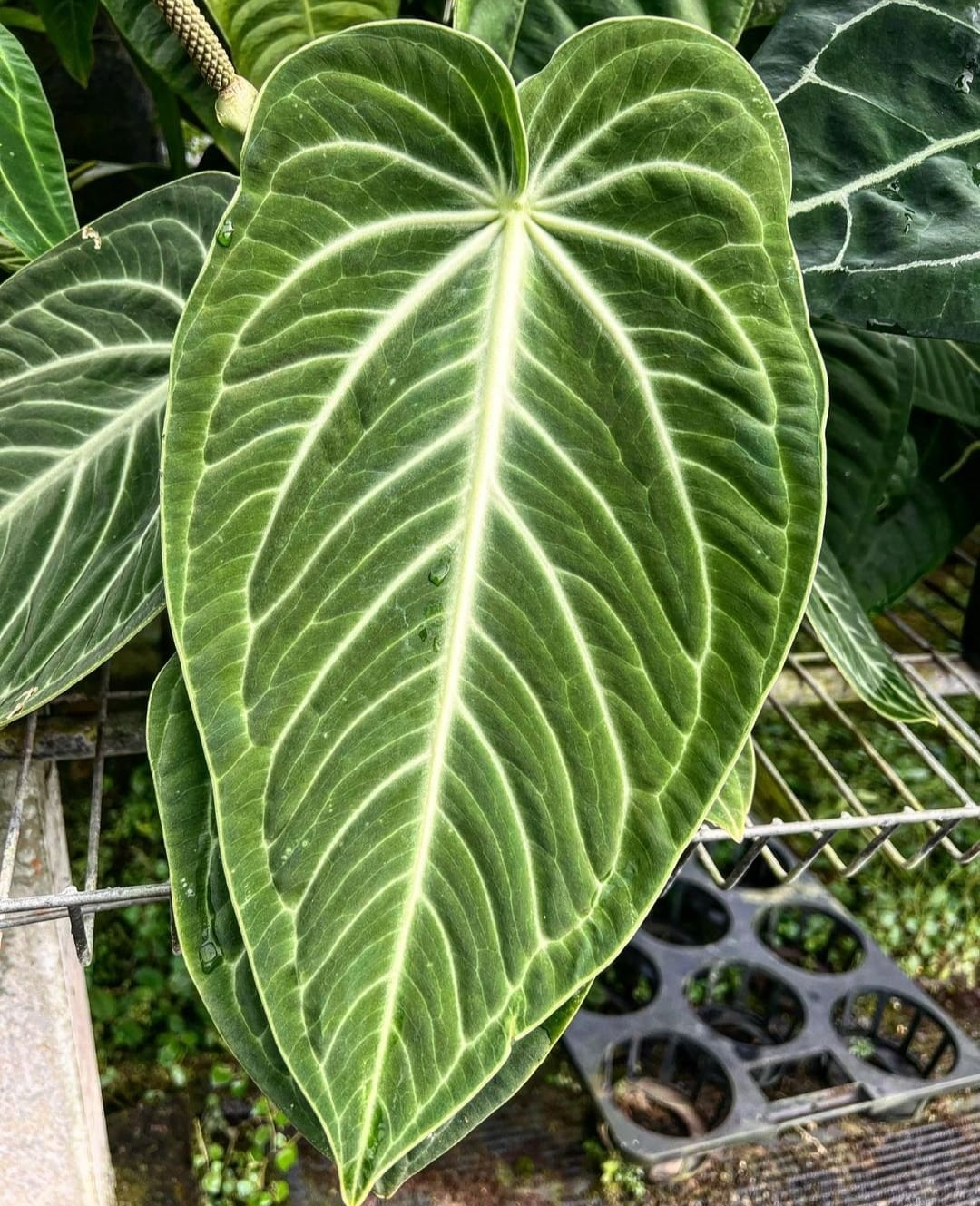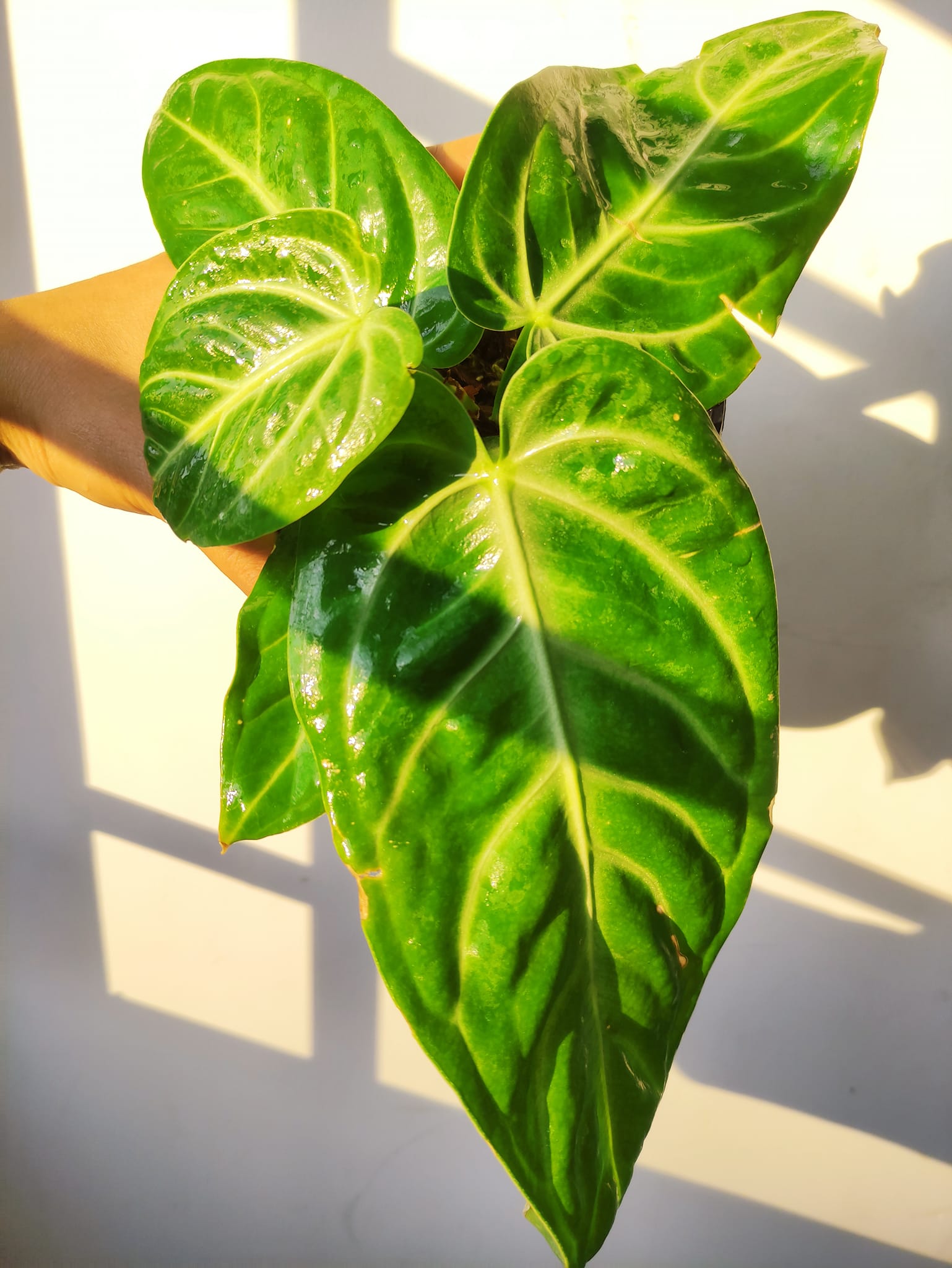The Anthurium Villenaorum is a stunning and rare variety of tropical Anthurium prized by plant collectors and enthusiasts for its vivid colors and distinctive features. In this blog post, we’ll explore everything you need to know about this exotic houseplant – from its origins and appearance to care and cultivation tips. Delve into the botanical qualities that make this Anthurium so sought-after and learn how you can add this vibrant variety to your own indoor jungle!

Origins and History
The Anthurium Villenaorum hails from the tropical forests of Ecuador in South America. First discovered and documented in 2013 near the Villenaorta waterfall by tropical plant expert Mireya Villenaorta, this variety is still relatively new to science and exceptionally rare in cultivation.
To understand more about the diverse origins of anthurium species, including Anthurium Villenaorum, you can explore the diverse world of anthuriums and their origins in our extensive guide.
Discovery and Documentation
- Mireya Villenaorta first spotted the plant growing as an epiphyte on trees near the cascading Villenaorta waterfall in Ecuador’s Esmeraldas province
- Struck by its unique features, she collected samples for further study and propagation
- Formally published its documentation as a new Anthurium variety in 2018
- Named the plant Anthurium Villenaorum in honor of the waterfall where it was originally found
Rarity in Cultivation
- Still limited availability since its recent discovery and documentation
- Slow and difficult to propagate, restricting widespread circulation
- High cost of imported plants limits accessibility for average collectors
- Traded and coveted by rare tropical plant enthusiasts as a prized specimen
Appearance and Characteristics
The Anthurium Villenaorum bears several standout physical features that make it so sought-after by plant collectors.
Foliage
- Oval-shaped leaves with prominently raised veins
- Leathery texture with slight quilting
- Vibrant dark green coloration
- Mature leaves reach approximately 18 inches in length
Flowers
- Conical yellow/green flower spikes like most Anthurium varieties
- But bearing significantly larger and more numerous flowers
- Each flower over 2 inches long with a purple exterior and contrasting yellow center
Additional Traits
- Grows as an epiphyte clinging to trees in tropical environments
- Aerial roots adapted to cling to bark and draw moisture and nutrients
- Capable of growing quite large in ideal settings – up to 3 feet tall and wide
If you’re intrigued by the unique characteristics and care requirements of different anthurium types, including Anthurium Villenaorum, explore our comprehensive collection of exotic anthurium types for more information.

“Discover the majestic beauty of the Anthurium Villenaorum! Click here to bring this exotic gem into your home today.”
Cultivation Requirements
Caring for this rare variety at home poses some challenges, but its magnificent appearance makes the effort worthwhile! Here are some key cultivation tips:
Light and Location
- Thrives in bright, indirect light indoors
- Some tolerance to lower light than most Anthuriums
- Appreciates humid environments – place on pebble trays near other tropicals
Water and Soil Needs
- Allow soil to partially dry out between waterings
- Likes consistently humid soil but dislikes soggy roots
- Plant in an airy, peat-based potting mix tailored for epiphytes
Temperature and Humidity
- Warm temperatures from 75°F to 85°F
- Average to high humidity around 60% or greater
- Can be grown outdoors year-round only in frost-free subtropical zones
Special Care and Handling
- Requires particularly clean water – use filtered or collected rainwater
- Mist leaves regularly to replicate natural precipitation
- Stake or trellis mature plants to account for size and weepiness
For those seeking detailed information on how to best care for Anthurium Villenaorum and other anthurium varieties, check out our comprehensive guide on thriving anthuriums.
Propagation and Availability
Expanding your Anthurium collection with this specific variety takes dedication – propagation is by no means simple, and sourcing plants can prove even more difficult.
Propagation Complexities
- Propagated by tissue culture or stem cuttings in specialty nurseries
- Cuttings prone to rot – require precise protocols in sterile environs
- Even expert growers report challenges rooting and acclimating cuttings successfully
Limited Availability
- Extremely limited circulation since initial discovery and documentation
- Restricted habitat coupled with tricky propagation constrains stock
- High price tag of $200+ per plant reflects rarity and difficulty acquiring
Responsible Sourcing Considerations
- Wild Anthurium Villenaorum populations are critically endangered
- Ensure imported plants are ethically and sustainably sourced
- Purchasing from reputable vendors supports conservation efforts

